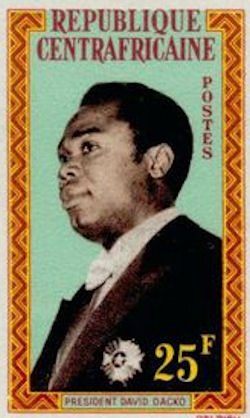David Dacko
 David Dacko presided over the nation's declaration of independence. Dacko's turbulent political career, in which he survived one assassination attempt and was twice removed from office by the military, mirrored the tumultuous history of his landlocked country, which by 2003 had seen nine coups and coup attempts since winning independence in 1960.
David Dacko presided over the nation's declaration of independence. Dacko's turbulent political career, in which he survived one assassination attempt and was twice removed from office by the military, mirrored the tumultuous history of his landlocked country, which by 2003 had seen nine coups and coup attempts since winning independence in 1960.
Dacko was born in Bouchia, a small town 70 miles from the capital, Bangui. The son of a smallscale farmer, he was educated at the Ecole Normale, in the neighbouring Congolese capital of Brazzaville, and became a teacher. A protègé of his cousin, President Barthelemy Boganda, he won a parliamentary seat as a member of the Social Evolution Movement of Black Africa (Mesan), became minister of agriculture at the age of 27.
The Legislative Assembly of the Central African Republic voted on December 1, 1958, for membership in the new community of self-governing states. Independence was proclaimed on August 13, 1960, and the next day the legislative assembly chose Mr. David Dacko as President. He took over as president of the landlocked nation after the independence leader Barthélemy Boganda was killed in a plane crash in 1959.
As president, Dacko's declared aim was to raise his country's standard of living and end inter-tribal strife. Dacko promoted a rapid "Central Africanization" of the CAR administration, which was accompanied by an increase in corruption and inefficiency, and increased the number of officials, Which increased salary spending in the national budget. The difficulties in securing sufficient income to pay the often inefficient and corrupt bureaucratic mass have been a serious problem for the CAR since then.
But by 1965 the country's economy was in crisis, and Dacko proposed austerity measures and cutting the military budget. In the meantime, he had invited his cousin, Jean Bedel Bokassa, who had served with the French in Indo-China, to reorganise the Army. Bokassa had risen to Chief of Staff, and on New Year's Day in 1966, he was overthrown by the future self-proclaimed Emperor Bokassa. Dacko - who had once remarked that Bokassa was "too stupid to stage a coup" - was placed under house arrest, where he remained for several years.
In 1979 Bokassa was deposed, with the aid of French paratroopers, while he was visiting Libya's Col Gadaffi to ask for money. Dacko once again became president, claiming that he had plotted the coup with the help of France and other friendly nations.
In March 1981 Dacko was re-elected as president for a six year term with 50.23 percent of the vote, But he immediately had to declare a "state of siege" as supporters of his main opponent, Angel Patasse, went on the rampage in Bangui. In July 1981 Dacko dissolved two opposition parties, suspended a third, and arrested some of their leaders. Two months later he was once again ousted in a coup.
On 01 September of 1981, Dacko was deposed in a bloodless coup d'etat carried out by the Chief of Staff of the Army, General André Kolingba, who may have had the support of the French security officers, who some suspected had acted without authorization from the new French Socialist Government led by President Mitterrand. Although such accusations have never been proven, Kolingba enjoyed a close relationship with France and the presidential guard under Colonel Mantion.
Although never to become President again, he ran as a candidate for President in 1992 and in 1999. In 1993 he founded and became leader of the Mouvement Pour La Democratie Et Le Developpement (MDD). Dacko continued to fight for better conditions for his country After General Bozizé deposed Patassé and proclaimed himself President, Dacko participated in the National Dialogue that began on September 9, 2003, but shortly after, on September 27, 2003, Dacko suffered an attack of asthma. He decided to travel to France to undergo medical treatment, but stopped in Yaounde, Cameroon.
David Dacko, former president of the Central African Republic who was ousted by the dictator Jean-Bedel Bokassa, died 22 November 2003. Dacko, who presided over the former French colony's independence only to be overthrown by Mr. Bokassa, his cousin, had long suffered from asthma and a heart condition. He died from respiratory problems, state radio said. he was flown to Yaounde, in neighbourng Cameroon, to be treated for asthma and heart problems - caused, he claimed, by being forced to sleep naked on a stone floor while imprisoned by Bokassa.
|
NEWSLETTER
|
| Join the GlobalSecurity.org mailing list |
|
|
|

